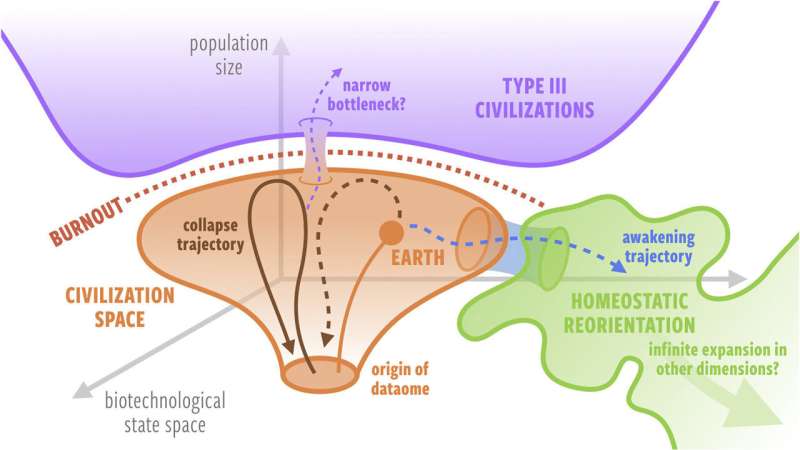May 12, 2022 report
Planetary scientists suggest a solution to the Fermi paradox: Superlinear scaling leading to a singularity

A pair of researchers, one with the Carnegie Institution for Science, the other with California Institute of Technology, has developed a possible solution to the Fermi Paradox. In their paper published in Journal of the Royal Society Interface, Michael Wong and Stuart Bartlett suggest that the reason that no aliens from other planets have visited us is because of superlinear scaling, which, they contend, leads to a singularity.
Several years ago, physicist Enrico Fermi, asked a colleague why aliens from outer space have not visited Earth. The two noted that due to the huge size of the universe, it seemed unlikely that Earth alone would harbor intelligent life. So Fermi famously asked "where are they?" In this new effort, the research pair have attempted to solve that riddle.
They began by studying how human civilizations rose and fell throughout history. Next, they studied the history of large cities, and there, too, they noticed that most grew to a certain point and then collapsed. They developed a hypothesis that suggested such rising and falling by alien space civilizations would lead to one of two scenarios. In the first, the civilization would come to realize they were growing too large and would cease traveling to or colonizing other worlds. In the second, they would not recognize their folly and would therefore collapse. From our perspective, both scenarios would have the same outcome—the aliens would not visit us, or even demonstrate evidence of their existence. The distance from them to us would be too far.
The researchers describe their hypothesis as superlinear scaling—where a civilization grows exponentially, colonizing other worlds until they became unable to sustain the energy demands of their constant encroachment. Eventually, if they did not take action, they would reach a singularity—a point of no return, at which they could not save their civilization from collapse. They note that were it not for the vast distances involved, we would likely easily spot evidence of an alien civilization on the point of collapse because it would be emitting enormous amounts of energy.
More information: Michael L. Wong et al, Asymptotic burnout and homeostatic awakening: a possible solution to the Fermi paradox? Journal of The Royal Society Interface (2022). DOI: 10.1098/rsif.2022.0029
Journal information: Journal of the Royal Society Interface
© 2022 Science X Network





















